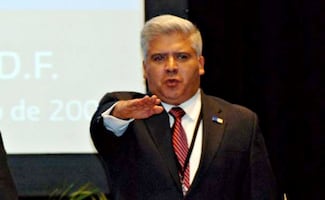Más Información

Morena se deslinda de dichos de vocera de su partido en la CDMX; narco es uno de los principales empleadores en México, dijo

Tras 17 horas, autoridades venezolanas liberan a periodista mexicano Julián Mazoy; “por ahora estoy bien”, dice

Suman tres exfuncionarios de García Luna detenidos, acusados en presunta red de lavado; así operaban

Operativo “Cisne Negro”, túneles y una película frustrada; así narró EL UNIVERSAL la recaptura de “El Chapo” hace 10 años

Desfile de embajadores y diplomáticos en Palacio Nacional; Quirino, Tatiana Clouthier, Genaro Lozano y Rutilio, entre ellos

Conversaciones con EU, oportunidad para "diálogo necesario" sobre Groenlandia: Dinamarca; "nosotros pedimos reunión", dice el territorio
Women who were sexually tortured by Mexican security forces over a decade ago testified through November 16and 17 before the Inter-American Court of Human Rights, in San José, Costa Rica, asking for an investigation into the case that happened in the state once run by President Enrique Peña Nieto .
Several of the 11 victims told judges at the Costa-Rica based court about the abuse they suffered after they were detained following a protest in May 2006 at the town of San Salvador de Atenco , about 25 miles (40 km) northeast of Mexico City . The town is located in the State of Mexico , which rings the capital.
“We’ve come here to speak out. In Mexico, justice has not been done,” said María Cristina Sánchez, 50, who detailed how she was beaten, sexually abused and how the case languished in Mexico’s criminal justice system with no resolution for years.
The women, known as the ‘Women of Atenco’ , say they were thrown into a police bus, raped and tortured following a two-day protest by a group of flower sellers who had negotiated a labor agreement that allowed them to set up stalls in a nearby downtown area.
The women were initially accused of illegally blocking public access but later acquitted of the charges. Before being elected president in 2012, Peña Nieto was governor of the State of Mexico, heading the country’s most populous state from in late 2005 till 2011.
“The Mexican government reiterates the recognition of its international responsibility... and its sincere will to fully repair the human rights violations in this case,” said Uriel Salas, an attorney representing Mexico in the case.
In the years since the abuses were committed, some police were accused of crimes, but there have been no convictions. “We deserve the recognition that we’re telling the truth, that the chain of command be investigated, not only so that justice is done, but so that these events never happen again,” said Norma Jiménez, 33, at the end of her testimony.
The final ruling in the case could take months. For her part, Margarette May Macaulay, vice-president of Inter-American Commission on Human Rights , insisted on the importance of guaranteeing the disappearance of torture, sexual abuse, and violent practices once and for all.
bg
Noticias según tus intereses
[Publicidad]
[Publicidad]








